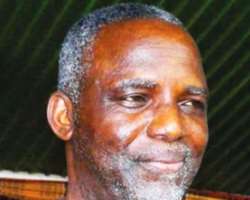PHCN LIQUIDATION: MATTERS ARISING

By KUNLE KALEJAYE
In the wake of media reports that workers of the Power Holding Company of Nigeria (PHCN) headquarters in Abuja, were been deployed to various successor companies across the nation, the workers unions and affected staff believed the PHCN has been liquidated.
To put issues on a clearer perspective, the Minister of Power, Prof. Bart Nnaji, for the first time since his appointment visited the Senior Staff Association of Electricity and Allied Companies, SSAEAC, in Lagos. Lots of issues were brought to the front burner
The National Union of Electricity Employees, NUEE, had earlier petitioned the Minster of Labour, Chief Emeka Wogu, to warn that if at the expiration of the ultimatum, government did not address its grievances; the sector would be shut down without notice.
*Minister of Power, Prof Bart Nnaji
In a second petition to Wogu dated January 20, NUEE also reiterated its call on the labour minister to prevail on his counterpart in the Power Ministry to abandon the liquidation PHCN until all labour related issues had been addressed. Besides, they noted that discussions were still on with the Comrade Hassan Sunmonu- led Negotiation Committee.
In the petition signed by NUEE General Secretary, Comrade Joe Ajaero, it read in part, 'It is worrisome that the same Government that appointed Comrade Hassan Sunmonu, as Negotiator/Concilliator in the negotiations between the Federal Government and the Labour Unions in PHCN on the Power Sector Reform has also jettisoned the issues already laid down for discussion by stakeholders.'
Special Assistant to the Minister of Power, on Labour Matters, Mr. Nick Agbo, had earlier debunked reports that there was a trade dispute between the ministry and its workers.
He said, 'There is no trade dispute between any of the three workers unions in the power sector and the ministry.'
Minister's visit
Nnaji said he was meeting the Senior Staff to clear issues with union. 'PHCN has not been liquidated; it is only the court that can give the order to liquidate PHCN.'
He, however, explained that operations at the PHCN headquarters were shut down based on the provisions of the Electric Power Sector Reform Act. 'What we are doing is re-deployment of staff; those deployed would not have their salaries, allowances or entitlements affected in any way.'
He said, the ministry had to make the move following directive from the Nigeria Electricity Regulatory Commission, NERC, to the effect that effective from January 1, 2012, the management of PHCN will no longer receive monthly N500million, as it was now a business entity on its own.
Nnaji noted that not all workers will be deployed to successor companies. 'AGM and above will not be re-deployed they will stay at the headquarters, Transmission Company of Nigeria, TCN workers, market operators and system operators will not be redeployed.'
But for the 1,050 principal managers and below, the minister said they have been sent to various successor companies, adding that the 2009 causal workers will be converted to permanent workers.
With regard to what the head office will be used for, the minister said, 'the NERC will manage the building. The building will host activities of the power sector; TCN will be the number one host while the ministry of power will move there.'
Questions unanswered
Despite the minister's explanations and assurances, many questions are still begging for answers. For instance, the unions are curious about the fate of the Managing Director/CEO of PHCN since other members of staff of the headquarters have been transferred to other companies.
They also wonder about the rationale behind the transfer of staff from one company to another to reinforce those other companies without their consent, how the terms of contract under the subsisting statuses were determined, the new identification for the workers and a plethora of other questions.
But Nnaji reassured that workers that upon the completion of negotiations new offers would be made to those deployed to the generation and distribution companies.
He added that the just concluded biometric exercise has been able to discover that there were three categories of workers in PHCN, which include the bona fide, the illegal and ghost workers.
'Bona fide worker will be paid their outstanding entitlement such as salaries as well as the 50 per cent pay rise covering June, July and August together with that of January.'
The minster also noted that President GoodLuck Jonathan administration is determined to execute the Electricity Sector Power Reform Act 2005.
'The Electricity Sector Power Reform Act 2005 is a detailed Act that we must follow because it is a law, and we have to abide by the rules of the law. The Act has led to the establishment of various companies like NAPTIN, which is meant for the training of PHCN workers because we know that for a long time now PHCN workers have not been trained and that is why we want to ensure that things are properly done.'
Going forward
Nnaji argued that the sector reforms will do the industry a whole lot of good because it will now be capable of generating additional 1000 mega watts (MW) for the benefit of all Nigerians.
He, therefore, appealed to the workers to show understanding and support for the Federal government's effort in restructuring the power sector, to enhance power delivery in the country.
